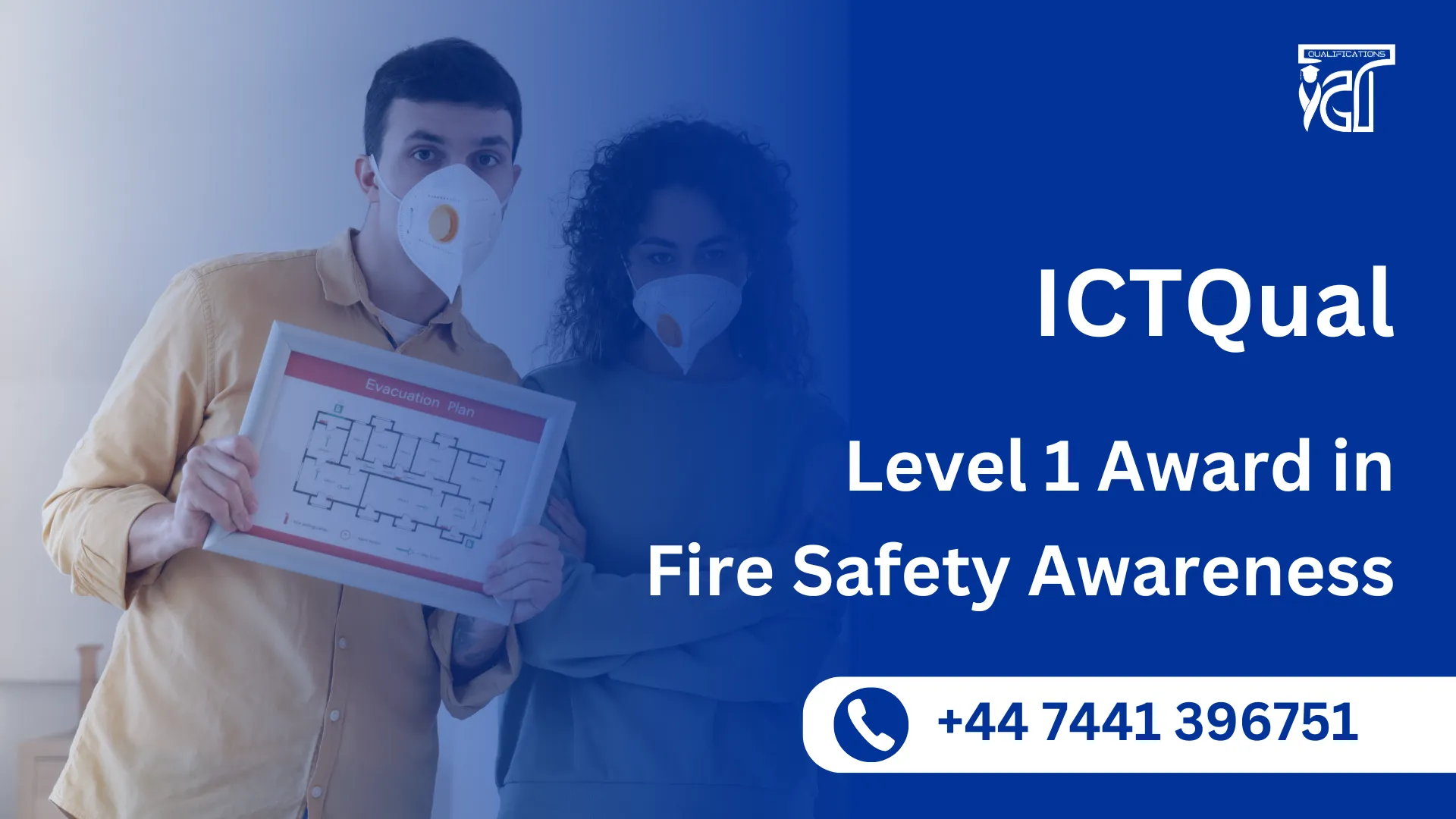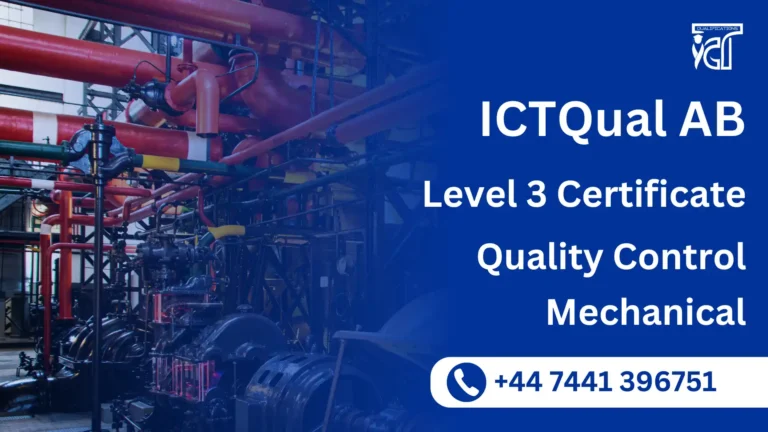In any workplace, fire safety is an essential aspect of maintaining a secure and productive environment. Whether you’re an employee in a small office or a large industrial setting, understanding fire safety basics can make all the difference in preventing accidents and minimizing harm during emergencies. The ICTQual Level 1 Award in Fire Safety Awareness provides crucial foundational knowledge about fire safety, making it an ideal qualification for individuals at all levels of an organization.
The ICTQual Level 1 Award in Fire Safety Awareness is an entry-level qualification designed to introduce individuals to the basic principles of fire safety in the workplace. It is suitable for anyone who works in an environment where fire hazards exist and is intended to provide the knowledge required to identify fire risks, prevent fires, and respond effectively in the event of an emergency.
This qualification is particularly ideal for employees with limited or no prior fire safety knowledge, as it covers the fundamentals of fire prevention, safety equipment, emergency procedures, and evacuation plans. The course focuses on raising awareness and helping individuals understand the importance of fire safety in the workplace, making it a vital addition to workplace safety training programs.
By completing the ICTQual Level 1 Award in Fire Safety Awareness, employees gain the knowledge to identify potential fire risks and take proactive steps to reduce these risks. This contributes to creating a safer working environment for everyone, reducing the likelihood of fire-related incidents and accidents.
The ICTQual Level 1 Award in Fire Safety Awareness is an essential qualification for anyone looking to enhance their understanding of fire safety and contribute to a safer workplace. Whether you are an employer looking to meet legal requirements or an employee seeking to gain vital safety knowledge, this qualification provides the foundation needed to recognize fire hazards, take preventive measures, and respond effectively in case of emergency.
Investing in this qualification not only helps ensure the safety of your workforce but also demonstrates a commitment to fire safety, legal compliance, and a culture of responsibility within the workplace.
For more information or to enroll in the ICTQual Level 1 Award in Fire Safety Awareness, contact an accredited training provider today.
ICTQual Level 1 Award in Fire Safety Awareness
Following are the study units of ICTQual Level 1 Award in Fire Safety Awareness.
- Introduction to Fire Safety
- Understanding Fire
- Fire Prevention
- Fire Detection and Warning Systems
- Emergency Response Procedures
- Using Firefighting Equipment
- Human Behavior in Fire Emergencies
- Fire Safety and First Aid
GLH (Guided Learning Hours) and TQT (Total Qualification Time) are terms commonly used in vocational qualifications to help define the amount of time a learner is expected to spend on their studies.
1. GLH (Guided Learning Hours)
GLH refers to the number of hours a learner spends being directly taught, supervised, or supported during their course. This includes the time spent in activities such as:
- Classroom instruction
- Practical workshops
- One-on-one tutoring or mentoring sessions
- Online learning sessions with tutor support
In other words, GLH represents the time that learners are actively engaged with their instructors or learning activities.
2. TQT (Total Qualification Time)
TQT represents the total amount of time a learner is expected to invest in completing a qualification, including:
- GLH (Guided Learning Hours): Time spent on direct learning, as explained above.
- Self-Directed Learning: This includes time spent on independent study, research, assignment completion, preparation for exams, and any other work the learner does outside of direct teaching hours.
TQT is a broader measure that includes all the time required to achieve the qualification. It helps learners and employers understand the overall commitment required for the qualification.
Key Differences Between GLH and TQT:
- GLH focuses on direct learning with guidance or supervision.
- TQT includes GLH as well as independent study time and other learning-related activities.
Example:
If a qualification has a TQT of 600 hours and a GLH of 250 hours, it means the learner should spend 250 hours in direct learning (classroom, online, or tutor-led sessions) and 350 hours on independent study or research.
Learning Outcomes for the Study Units:
1. Introduction to Fire Safety
- Identify the Importance of Fire Safety: Understand why fire safety is crucial in the workplace.
- Recognize Fire Safety Legislation: Familiarize with key fire safety laws and regulations.
- Define Roles and Responsibilities: Know the specific fire safety duties of employers, employees, and fire safety officers.
2. Understanding Fire
- Explain the Fire Triangle: Understand the elements required for fire (heat, fuel, oxygen) and how they interact.
- Classify Types of Fires: Differentiate between various classes of fires (A, B, C, D, F) and their unique characteristics.
- Identify Common Fire Causes: Recognize typical causes of workplace fires and how they can be prevented.
3. Fire Prevention
- Conduct Fire Risk Assessments: Learn to identify potential fire hazards through systematic risk assessments.
- Implement Preventive Measures: Apply best practices to minimize fire risks, including proper housekeeping and storage.
- Understand Safety Signage: Interpret fire safety signs and notices accurately and understand their importance in prevention.
4. Fire Detection and Warning Systems
- Differentiate Fire Detection Devices: Identify various types of fire detection systems (smoke detectors, heat detectors) and their functions.
- Understand Alarm Systems: Comprehend the importance and operation of fire alarm systems in early fire detection and evacuation.
5. Emergency Response Procedures
- Develop Evacuation Plans: Create and understand effective evacuation procedures tailored to specific workplaces.
- Identify Assembly Points: Recognize safe assembly points and conduct accurate headcounts during an evacuation.
- Assign Roles During Evacuation: Know the responsibilities of fire wardens and other personnel during fire emergencies.
6. Using Firefighting Equipment
- Use Fire Extinguishers Properly: Demonstrate correct use of different types of fire extinguishers (water, foam, CO2, dry powder).
- Operate Other Firefighting Tools: Understand the use of fire blankets, hoses, and other firefighting equipment.
- Perform Practical Application: Apply knowledge in hands-on training scenarios involving firefighting equipment.
7. Human Behavior in Fire Emergencies
- Analyze Psychological Responses: Understand typical human reactions during fire emergencies and how to manage them.
- Communicate Effectively: Implement effective communication strategies to ensure calm and orderly evacuation.
8. Fire Safety and First Aid
- Administer First Aid for Burns: Provide basic first aid treatment for burns and other fire-related injuries.
- Coordinate Emergency Medical Response: Work effectively with emergency services to manage fire-related injuries and provide immediate care.
Benefits of the ICTQual Level 1 Award in Fire Safety Awareness
The ICTQual Level 1 Award in Fire Safety Awareness offers numerous advantages for both individuals and organizations. Here are the key benefits of this essential fire safety qualification:
1. Increased Fire Safety Awareness
This course helps raise awareness of fire hazards in the workplace, teaching employees how to identify potential risks and take proactive measures to prevent fires. A better understanding of fire safety leads to a heightened sense of vigilance, which ultimately contributes to a safer working environment for everyone.
2. Compliance with Fire Safety Regulations
Under fire safety laws and regulations, such as the Regulatory Reform (Fire Safety) Order 2005, employers are required to ensure their employees are adequately trained in fire safety. The ICTQual Level 1 Award in Fire Safety Awareness helps organizations meet these legal requirements, reducing the risk of non-compliance and potential penalties.
3. Foundation for Further Fire Safety Training
The Level 1 Award provides a solid foundation for individuals looking to pursue more advanced fire safety qualifications, such as fire marshal training or health and safety management. It equips employees with the basic knowledge they need to progress further in fire safety education.
4. Improved Emergency Response
With training on emergency procedures and evacuation plans, employees will be better prepared to respond quickly and effectively during a fire. This knowledge can save lives, reduce injuries, and minimize property damage in the event of a fire emergency.
5. Cost-Effective Training
The ICTQual Level 1 Award is a short, affordable course that offers high value for businesses looking to train their employees in fire safety. It provides essential fire safety knowledge without requiring a significant time or financial commitment, making it an efficient and cost-effective solution for organizations.
6. Enhances Workplace Safety Culture
Providing fire safety training demonstrates a commitment to the well-being of employees and fosters a culture of safety within the workplace. Employees are more likely to take responsibility for their own safety and that of their colleagues when they understand the importance of fire prevention and preparedness.
7. Increases Employee Confidence
Employees who complete the ICTQual Level 1 Award in Fire Safety Awareness gain confidence in their ability to handle fire-related emergencies. This confidence helps them remain calm and composed during emergencies, ensuring a more effective response.
8. Accessible for All Employees
The ICTQual Level 1 Award is designed for individuals at all levels of an organization, making it suitable for a wide range of employees. Whether you’re a new hire or a seasoned staff member, this course provides essential fire safety knowledge that everyone can benefit from.
9. Minimizes Risk of Fire-Related Accidents
By educating employees about fire prevention, safety equipment, and emergency procedures, the ICTQual Level 1 Award helps reduce the likelihood of fire-related accidents. Proactive fire safety measures can significantly lower the risk of workplace fires and their associated costs.
10. Boosts Organizational Reputation
Companies that prioritize fire safety training demonstrate a commitment to employee well-being and regulatory compliance. This can enhance the organization’s reputation, showcasing it as a responsible employer that values safety and follows best practices.
The ICTQual Level 1 Award in Fire Safety Awareness offers valuable benefits for both individuals and organizations. From improving fire safety awareness and compliance to fostering a safer workplace culture, this qualification is a vital step toward reducing fire-related risks and ensuring a prompt and effective response in the event of an emergency. Whether you’re an employee or an employer, this course is a wise investment in workplace safety.
Best Fit for the ICTQual Level 1 Award in Fire Safety Awareness
The ICTQual Level 1 Award in Fire Safety Awareness is an essential qualification designed for individuals across various sectors who need to gain fundamental fire safety knowledge. It’s perfect for those looking to understand the basics of fire hazards, prevention techniques, and emergency response protocols. Below are the key groups and roles for whom this course is the ideal fit:
1. New Employees and Entry-Level Workers
For individuals who are new to the workforce or are starting a job in a role that involves potential fire hazards, the ICTQual Level 1 Award in Fire Safety Awareness offers a vital introduction to fire safety. This course equips employees with the basic knowledge needed to identify fire risks and follow essential fire safety practices, ensuring they are prepared from day one.
2. All Staff Members in High-Risk Environments
Employees working in high-risk environments, such as warehouses, factories, or construction sites, where fire hazards are more prevalent, will greatly benefit from this course. The ICTQual Level 1 Award provides them with an understanding of fire prevention, emergency response, and evacuation procedures, which is crucial for ensuring their safety in these potentially hazardous environments.
3. Administrative Staff in Offices and Public Buildings
Office workers, administrative staff, and employees in public spaces who may not directly handle high-risk materials but still need to be aware of fire safety protocols, will benefit from the foundational knowledge offered by this course. The training ensures that all employees know the basics of fire safety, how to prevent risks, and how to evacuate safely in case of an emergency.
4. Health and Social Care Workers
Healthcare workers, including nurses, caregivers, and medical assistants, work in environments where fire safety is crucial. The ICTQual Level 1 Award in Fire Safety Awareness is ideal for this group, as it prepares them to handle fire-related emergencies, especially in hospitals, nursing homes, or other care facilities, where vulnerable individuals may require additional assistance during an evacuation.
5. Managers and Supervisors
While supervisors and managers may eventually pursue more advanced fire safety certifications, the ICTQual Level 1 Award is an excellent starting point. It ensures that those in leadership positions have a basic understanding of fire safety, which helps them oversee emergency procedures, manage fire drills, and promote a culture of safety within their teams.
6. Small Business Owners
Small business owners who are responsible for the safety of their employees and premises can benefit from the ICTQual Level 1 Award in Fire Safety Awareness. The course equips business owners with the knowledge to recognize fire risks, implement preventive measures, and create effective emergency plans, ensuring they comply with legal fire safety obligations and reduce the risk of fire incidents.
7. Individuals in Customer-Facing Roles
Employees who interact with customers in retail, hospitality, and other public-facing industries should be trained in basic fire safety. Understanding how to safely evacuate a building, assist customers during a fire, and use fire safety equipment is essential. This course ensures that frontline workers are prepared to respond appropriately during a fire emergency, keeping both themselves and the public safe.
8. Health and Safety Enthusiasts and Aspiring Safety Professionals
Those who are considering a career in health and safety or wish to build a foundational understanding of fire safety before progressing to more advanced qualifications will find the ICTQual Level 1 Award invaluable. This qualification is an ideal first step for those looking to build a career in safety management or workplace health and safety roles.
9. Contractors and Temporary Workers
Contractors or temporary employees who are brought in to work on short-term projects may not always receive in-depth fire safety training. The ICTQual Level 1 Award ensures that these workers are aware of the basic fire safety protocols required to stay safe while on site, regardless of the length of their employment.
10. Fire Safety Volunteers and Fire Marshals
While more advanced qualifications may be required for fire marshals or designated safety officers, the ICTQual Level 1 Award is a great introductory course for those new to the fire safety role. Volunteers and entry-level safety officers can benefit from learning the basics of fire prevention, safety procedures, and evacuation protocols.
The ICTQual Level 1 Award in Fire Safety Awareness is an excellent fit for anyone looking to gain essential fire safety knowledge, particularly those who are new to the workplace or work in environments where fire risks exist. From new employees to managers, healthcare workers to small business owners, this course provides crucial fire safety awareness that can help ensure a safe working environment, promote compliance with fire safety regulations, and reduce the risk of fire-related incidents. It’s an ideal starting point for anyone seeking to enhance their understanding of fire safety in the workplace.
Entry Requirements
Register Now
Qualification Process
Qualification Process for the ICTQual Level 1 Award in Fire Safety Awareness
- Self-Assessment:
Begin by evaluating your eligibility to ensure you meet the qualification requirements, including work experience, knowledge, and language proficiency. - Registration:
Complete your registration by submitting the required documents, including a scanned copy of a valid ID, and paying the registration fee. - Induction:
An assessor will conduct an induction to confirm your eligibility for the course and explain the evidence requirements. If you do not meet the criteria, your registration will be canceled, and the fee will be refunded. - Assignmnets & Evidence Submission:
Provide all assignmnets and the necessary evidence based on the assessment criteria outlined in the course. If you are unsure of the required evidence, consult with the assessor for guidance on the type and nature of evidence needed. - Feedback and Revision:
The assessor will review your submitted evidence and provide feedback. Evidence that meets the criteria will be marked as “Criteria Met,” while any gaps will be identified. You will be asked to revise and resubmit if needed. - Competence Evidence:
Submit final evidence demonstrating that all learning outcomes have been met. This evidence will be marked as “Criteria Met” by the assessor once it is satisfactory. - Internal Quality Assurance (IQA):
The Internal Quality Assurance Verifier (IQA) will review your evidence to ensure consistency, quality, and compliance with standards. - External Verification:
The IQA will submit your portfolio to ICTQUAL AB External Quality Assurance Verifiers (EQA) for final confirmation. The EQA may contact you directly to verify the authenticity of your evidence. - Certification:
Upon successful completion of all checks, ICTQUAL AB will issue your official certificate, confirming that you have attained the ICTQual Level 1 Award in Fire Safety Awareness.







